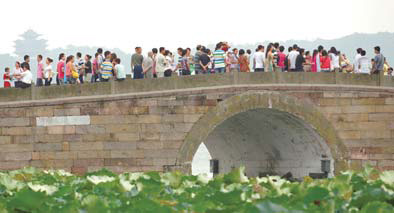Festival losing some of its old family traditions
For centuries, the Mid-Autumn Festival has been a time of Chinese family reunions, but it is increasingly becoming a time for getting away and enjoying some travel.
 |
|
Tourists on Wednesday swarm on the Broken Bridge, a well-known attraction of the West Lake in Hangzhou, Zhejiang province. |
Cai Ruiming works at a construction site in Baoding city, North China's Hebei province, while his family lives in his hometown in East China's Zhejiang province.
Rather than returning home to spend time with his parents and children, Cai decided to do a little sightseeing with his wife. She will join him in Hebei and then they plan to visit Beijing.
The Mid-Autumn Festival is celebrated on the 15th day of the eighth month in the Chinese lunar calendar, which falls on Sept 22 this year. This date is when the moon is supposedly at its fullest and brightest, and families come together to eat the traditional delicacy, the mooncake.
As a construction worker, Cai has spent much of his time during the past 10 years away from home, going wherever his construction projects take him.
The three-day festival vacation is one of the key national holidays in China. Since many people work far away from home, it seems unwise to spend two days on the road just to stay home for one day. Therefore, many people like Cui choose to visit nearby places.
Travel agencies also see a growing number of people who join their one-day tours during the vacation.
"This holiday is a busy time for us. We increased our number of one-day tours from once a week to a daily basis," said an employee with the Jinan-based Shandong Jiahua Travel Agency.
While spending time with or without family may be a personal choice, many primary school teachers said they worry that many children no longer know their own traditions and culture.
"I only know that people eat mooncakes during the Mid-Autumn Festival," said Zhang Fan, a pupil from Yindu Primary School in Chengdu, capital of Southwest China's Sichuan province.
"Without experiencing the festival rituals themselves, many children don't know what the festival is really about, although I told them about it during class," said a teacher surnamed Zhang at the school.
Hu Guangwei of the Sichuan Academy of Social Sciences gave one reason why many people are having a less traditional holiday.
"In ancient China, it was difficult for people to feed themselves, so having a nice dinner with their family was very much a celebration in itself. Now people can afford it every day, so its charm has worn off."
Also, Chinese traditional festivals are mainly family-oriented and private, which may not be very attractive to fun-loving young people, experts said.
The celebrations of the festival should go beyond the usual family dinners and the same old mooncake, and include new forms of entertainment, such as carnivals, Hu said.
"However, no matter how people choose to celebrate the festival, the essence is still the same: wishing for safety and happiness for one's family," said Wang Zhongwu, a sociology professor at Shandong University.
 0
0 







Go to Forum >>0 Comments